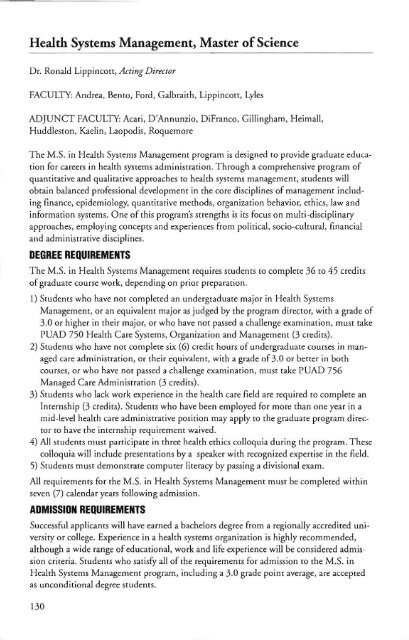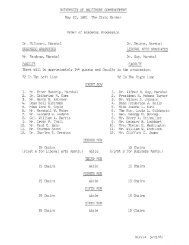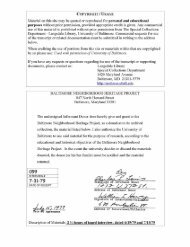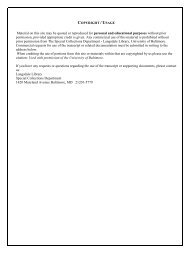2003-2005 - Special Collections - University of Baltimore
2003-2005 - Special Collections - University of Baltimore
2003-2005 - Special Collections - University of Baltimore
You also want an ePaper? Increase the reach of your titles
YUMPU automatically turns print PDFs into web optimized ePapers that Google loves.
Health Systems Management, Master <strong>of</strong>Science<br />
Dr. Ronald Lippincott, Acting Director<br />
FACULTY: Andrea, Bento, Ford, Galbraith, Lippincott, Lyles<br />
ADJUNCT FACULTY: Acari, D'Annunzio, DiFranco, Gillingham, Heimall,<br />
Huddleston, Kaelin, Laopodis, Roquemore<br />
The M .S. in Health Systems Management program is designed to provide graduate education<br />
for careers in health systems administration. Through a comprehensive program <strong>of</strong><br />
quantitative and qualitative approaches to health systems management, students will<br />
obtain balanced pr<strong>of</strong>essional development in the core disciplines <strong>of</strong> management including<br />
finance, epidemiology, quantitative methods, organization behavior, ethics, law and<br />
information systems. One <strong>of</strong> this program's strengths is its focus on multi-disciplinary<br />
approaches, employing concepts and experiences from political, socio-cultural, financial<br />
and administrative disciplines.<br />
DEGREE REQUIREMENTS<br />
The M .S. in Health Systems Management requires students to complete 36 to 45 credits<br />
<strong>of</strong> graduate course work, depending on prior preparation.<br />
I) Students who have not completed an undergtaduate major in Health Systems<br />
Management, or an equivalent major as judged by the program director, with a grade <strong>of</strong><br />
3.0 or higher in their major, or who have not passed a challenge examination, must rake<br />
PUAD 750 Health Care Systems, Organization and Management (3 credits).<br />
2) Students who have not complete six (6) credit hours <strong>of</strong> undergraduate courses in managed<br />
care administration, or their equivalent, with a grade <strong>of</strong> 3.0 or better in both<br />
courses, or who have nor passed a challenge examination, must take PUAD 756<br />
Managed Care Administration (3 credits).<br />
3) Students who lack work experience in the health care field are required to complete an<br />
Internship (3 credits). Students who have been employed for more than one year in a<br />
mid-level health care administrative position may apply to the graduate program director<br />
to have the internship requirement waived.<br />
4) All students must participate in three health ethics colloquia during the program. These<br />
colloquia will include presentations by a speaker with recognized expertise in the field.<br />
5) Students must demonstrate computer literacy by passing a divisional exam.<br />
All requirements for the M.S. in Health Systems Management must be completed within<br />
seven (7) calendar years following admission.<br />
ADMISSION REQUIREMENTS<br />
Successful applicants will have earned a bachelors degree from a regionally accredited university<br />
or college. Experience in a health systems organization is highly recommended,<br />
although a wide range <strong>of</strong> educational, work and life experience will be considered admission<br />
criteria. Students who satisfy all <strong>of</strong> the requirements for admission to the M .S. in<br />
Health Systems Management program, including a 3.0 grade point average, are accepted<br />
as unconditional degree students.<br />
130
















